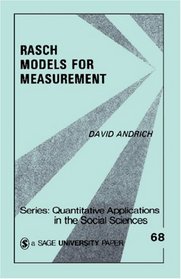Search -
Rasch Models for Measurement (Quantitative Applications in the Social Sciences)
Rasch Models for Measurement - Quantitative Applications in the Social Sciences
Author:
Examines the use of Rasch measurement models in the social sciences. This lucid introduction first focuses on general principles, so the applications and algebra of the model can be readily understood. Andrich then connects Rasch models to common procedures for social science measurement. Avoiding polemics, Andrich's presentation allows comparis... more »
Author:
Examines the use of Rasch measurement models in the social sciences. This lucid introduction first focuses on general principles, so the applications and algebra of the model can be readily understood. Andrich then connects Rasch models to common procedures for social science measurement. Avoiding polemics, Andrich's presentation allows comparis... more »
ISBN-13: 9780803927414
ISBN-10: 080392741X
Publication Date: 3/1/1988
Pages: 96
Rating: ?
ISBN-10: 080392741X
Publication Date: 3/1/1988
Pages: 96
Rating: ?
0 stars, based on 0 rating
Genres:
- Health, Fitness & Dieting >> Psychology & Counseling
- Nonfiction >> Social Sciences >> Methodology
- Nonfiction >> Social Sciences >> Research
- Nonfiction >> Social Sciences >> Sociology >> General
- Science & Math >> Mathematics >> Applied >> Probability & Statistics
- Engineering & Transportation >> Professional Science >> Mathematics >> Applied >> Statistics




